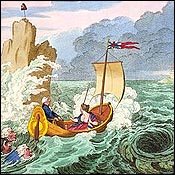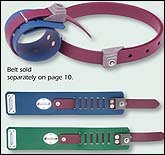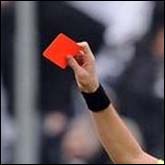 Sometimes, believe it or not, export compliance efforts might be a bit overzealous and lead to other problems. Several readers brought to my attention this story at the Consumerist website suggesting that Apple Store employees in Georgia were refusing to sell iPads and other coveted Apple goodies to customers who spoke Farsi on the grounds that such sales would violate the U.S. embargo against Iran. Now, leaving aside the entire issue of how an Apple Store “genius” in Georgia is going to recognize that someone is speaking Farsi (as opposed to say, Pashto, or even, this being Georgia, French), this would seem to be a little problematic. In one case, the rebuffed customer was an American of Iranian descent who was speaking Farsi with her uncle.
Sometimes, believe it or not, export compliance efforts might be a bit overzealous and lead to other problems. Several readers brought to my attention this story at the Consumerist website suggesting that Apple Store employees in Georgia were refusing to sell iPads and other coveted Apple goodies to customers who spoke Farsi on the grounds that such sales would violate the U.S. embargo against Iran. Now, leaving aside the entire issue of how an Apple Store “genius” in Georgia is going to recognize that someone is speaking Farsi (as opposed to say, Pashto, or even, this being Georgia, French), this would seem to be a little problematic. In one case, the rebuffed customer was an American of Iranian descent who was speaking Farsi with her uncle.
A second case, however, was a bit more problematic. It involved an Iranian student properly in the United States on a student visa who wanted to buy an iPhone. The writer at the Consumerist, naturally being an expert on export law, quickly disposed of this issue.
In the second case, of the man here on a student visa, you might be able to make that argument, though it’s really just the exporting of goods to Iran — and not the sale of items to Iranians in the U.S. — that is embargoed.
Well, we must give the Consumerist guy some points for effort, but the issue is just a little more complicated than that. First, you can’t sell anything to an Iranian in the United States if you have any reason to believe that the item might be exported back to Iran by the purchaser. In the case of an iPhone, which is probably locked to a U.S. carrier, the export of that item seems unlikely.
Second, you can’t forget about the “deemed export” rules which could forbid transfer of certain technology to Iranian citizens in the United States, even on a legitimate visa. (Does the name Dr. Roth ring a bell?) And in some instances, given that the Export Administration Regulations, make clear that “visual inspection” can be a technology transfer, there might be certain items that you can’t sell to Iranian citizens in the United States. However, iPads, iPhones and Airbooks, aren’t among those items.
The nice folks at Apple have a listing of ECCNs on their website. (Would that more companies would do that!) The iPad, iPhone and even the Mac Book Air, are all classified as 5A992. (None of them has the horsepower, apparently to fit under 4A994, which covers certain personal computing devices.) Now here’s where the analysis gets slightly tricky. ECCN 5E992 controls technology for the “use” of items controlled by 5A992. Would the manual for these devices, or even the visual inspection of these devices, provide information about the “use” of the devices? If so, their sales to an Iranian citizen in the U.S. on a visa would require a license.
The reason it doesn’t is because of BIS’s rather odd definition of “use.” I’ll let BIS speak for itself on this point:
Keep in mind that the deemed export rule does not regulate the operation of controlled equipment. Rather, it is a release to a foreign national of export-controlled “use†technology that may have deemed export licensing implications, and “use†technology includes all of the attributes of “use†as defined in the EAR Part 772 (i.e., operation, installation, maintenance, repair, refurbishing and overhaul). If the foreign national has access only to the technology that is necessary to operate the export controlled equipment, a release of “use†technology has not occurred and no deemed export license requirement is triggered.
So since neither the manual or visual inspection of the Apple stuff will help the purchaser repair, refurbish or overhaul those items, Apple is free to sell them away to Iranians in the United States unless, of course, it has reason to believe that the Iranian is going to ship the goods back to Iran or take them back to Iran upon the visa-holders return.
 A colleague brought back an interesting tidbit from the BIS Update Conference last week relating to one of the unresolved conundrums of the current export reform efforts. Under the currently proposed reforms, certain items on the United States Munitions List will be transferred to the Commodity Control List, which will transfer licensing jurisdiction over those items from the Department of State’s Directorate of Defense Trade Controls (“DDTC”) to the Department of Commerce’s Bureau of Industry and Security (“BIS”). That process is summarized in some detail in this BIS fact sheet.
A colleague brought back an interesting tidbit from the BIS Update Conference last week relating to one of the unresolved conundrums of the current export reform efforts. Under the currently proposed reforms, certain items on the United States Munitions List will be transferred to the Commodity Control List, which will transfer licensing jurisdiction over those items from the Department of State’s Directorate of Defense Trade Controls (“DDTC”) to the Department of Commerce’s Bureau of Industry and Security (“BIS”). That process is summarized in some detail in this BIS fact sheet.
 Posted by
Posted by  Category:
Category: 

 A Wisconsin-based company, with the appealing name
A Wisconsin-based company, with the appealing name  The Bureau of Industry and Security (“BIS”) recently released
The Bureau of Industry and Security (“BIS”) recently released  Ahem. Here is what
Ahem. Here is what  Sometimes, believe it or not, export compliance efforts might be a bit overzealous and lead to other problems. Several readers brought to my attention this
Sometimes, believe it or not, export compliance efforts might be a bit overzealous and lead to other problems. Several readers brought to my attention this 

